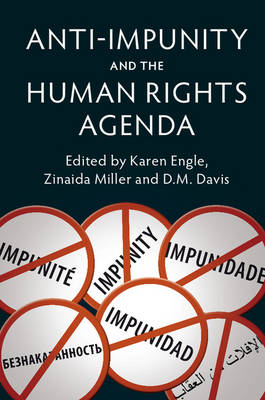
Anti-Impunity and the Human Rights Agenda
Cambridge University Press (Verlag)
978-1-107-43922-1 (ISBN)
In the twenty-first century, fighting impunity has become both the rallying cry and a metric of progress for human rights. The new emphasis on criminal prosecution represents a fundamental change in the positions and priorities of students and practitioners of human rights and transitional justice: it has become almost unquestionable common sense that criminal punishment is a legal, political, and pragmatic imperative for addressing human rights violations. This book challenges that common sense. It does so by documenting and critically analyzing the trend toward an anti-impunity norm in a variety of institutional and geographical contexts, with an eye toward the interaction between practices at the global and local levels. Together, the chapters demonstrate how this laser focus on anti-impunity has created blind spots in practice and in scholarship that result in a constricted response to human rights violations, a narrowed conception of justice, and an impoverished approach to peace.
Karen Engle is Minerva House Drysdale Regents Chair in Law, and Founder and Co-Director of the Bernard and Audre Rapoport Center for Human Rights and Justice at the University of Texas, Austin. She is the 2016–17 Deborah Lunder and Alan Ezekowitz Founders' Circle Member at the Institute for Advanced Study, Princeton, New Jersey. Zinaida Miller is Assistant Professor at the School of Diplomacy and International Relations, Seton Hall University, New Jersey. D. M. Davis is Judge President of the Competition Appeal Court of South Africa, and a Judge of the High Court of Cape Town. He is Honorary Professor of Law at the University of Cape Town.
Introduction; Part I. What Does Anti-Impunity Mean?: 1. A genealogy of the criminal turn in human rights Karen Engle; 2. Anti-impunity as deflection of argument Samuel Moyn; 3. Doing history with impunity Vasuki Nesiah; Part II. How and Where Does Anti-Impunity Operate?: 4. The South African Truth Commission and the AZAPO case: a reflection almost two decades later D. M. Davis; 5. Anti-impunity politics in post-genocide Rwanda Zinaida Miller; 6. Whose exceptionalism? Debating the inter-American view on amnesty and the Brazilian case Fabia Fernandes Carvalho Veçoso; 7. The distributive politics of impunity and anti-impunity: lessons from four decades of Colombian peace negotiations Helena Alviar García and Karen Engle; 8. From political repression to torturer impunity: the narrowing of Filártiga v. Peña-Irala Natalie R. Davidson; Part III. Are There Alternatives to Anti-Impunity?: 9. Impunity in a different register: people's tribunals and questions of judgment, law and responsibility Dianne Otto; 10. Beyond Nuremberg: the historical significance of the post-Apartheid transition in South Africa Mahmood Mamdani.
| Erscheinungsdatum | 14.12.2016 |
|---|---|
| Zusatzinfo | 1 Tables, black and white; 1 Line drawings, black and white |
| Verlagsort | Cambridge |
| Sprache | englisch |
| Maße | 151 x 227 mm |
| Gewicht | 560 g |
| Themenwelt | Recht / Steuern ► EU / Internationales Recht |
| Recht / Steuern ► Öffentliches Recht ► Verfassungsrecht | |
| Recht / Steuern ► Strafrecht ► Strafverfahrensrecht | |
| Sozialwissenschaften ► Politik / Verwaltung | |
| ISBN-10 | 1-107-43922-1 / 1107439221 |
| ISBN-13 | 978-1-107-43922-1 / 9781107439221 |
| Zustand | Neuware |
| Haben Sie eine Frage zum Produkt? |
aus dem Bereich


